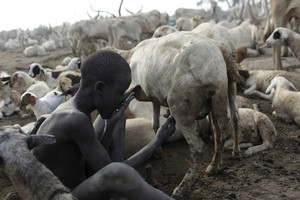South Sudan: Economic Challenges Await the New Nation
By Lillian Tabu
 JUBA---With just a few days remaining before the official results of the southern Sudan referendum are announced, the dice seems to have been cast with unofficial results from the counted votes depicting 99 per cent of people have opted to split from the north, say officials.
JUBA---With just a few days remaining before the official results of the southern Sudan referendum are announced, the dice seems to have been cast with unofficial results from the counted votes depicting 99 per cent of people have opted to split from the north, say officials.
For the people of Southern Sudan this means freedom to them after many years of war attributed to marginalization arising from religious differences and unequal distribution of resources.
Sudan exports billions of dollars of oil per year, with southern states producing more than 80 per cent of it. In return, they only receive 50 per cent of the revenue, exacerbating tensions with the north which is mainly arid, but ironically more developed than the fertile southern regions.
Conflicts, poverty and food insecurity is the situation that surrounds the inhabitants of Southern Sudan. Residents of war affected regions like Darfur and Southern Sudan are still dependent on food aid, far more than in the North, which is wealthier, urbanized and less reliant on agriculture.
The 22-year conflict between the North and South broke out in 1983 when the then President Ja’far Numeiry imposed Sharia law countrywide. It is noteworthy that President Al Bashir has vowed to reintroduce Sharia law in the North should the South vote to secede.
Economically, Northern Sudan will be the ultimate loser if secession takes place since Southern Sudan holds the majority resources.
With the international community intent on pardoning Southern Sudan’s debt, Southern Sudan will have a new beginning with an advantage over many African nations.
However the major challenge will lay with their resources management.
The many years at war translated to only few Southerners are educated, and many more out of the country. This implies that for fast development the new state will have to urge their nationals abroad to return and build the nation or fully seek expertise from neighboring nations like Kenya which has been on the forefront in the peacemaking process.



